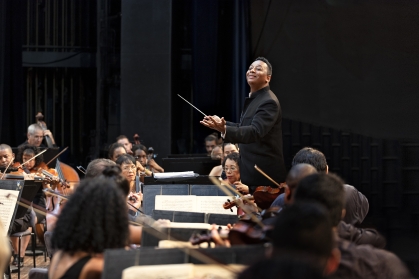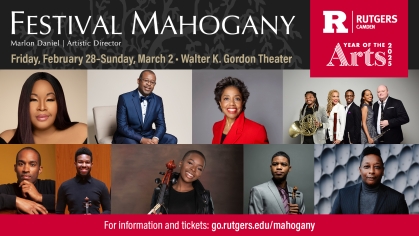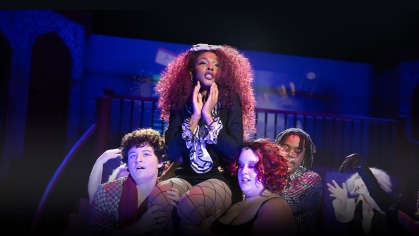Piano to Podium: The Upward Movement of Conductor Marlon Daniel

Daniel’s Festival Mahogany will showcase the works of Black composers and musicians at Rutgers–Camden
From being recognized as a piano prodigy at age seven to leading world-class orchestras and heading international classical music festivals, Marlon Daniel, a musician and conductor, is justifiably admired for his many talents. However, Daniel, an educator and mentor to upcoming musicians and conductors, takes pride in safeguarding that people of color can flourish in the elite world of classical music.
Daniel and Rutgers University–Camden are joining forces to host Festival Mahogany, held on campus from February 28 to March 2. Daniel will lead the Camden-based Symphony in C orchestra in two concerts spotlighting the works of Black composers. Additionally, at a symposium and chamber concert titled “Shattering the Glass Ceiling,” Chancellor Antonio D. Tillis will lead a panel discussion exploring the state of art and culture in the 21st century.
Daniel, a native of the West Side of Chicago, rose to prominence as a pianist and conductor after graduating from the Manhattan School of Music. The glass ceilings he hit over and over could not prevent his talent from shining through as he worked to achieve success.
“No Black conductors are leading any of the top ten American orchestras,” Daniel said. “That includes the Chicago Symphony Orchestra, the Boston Symphony Orchestra, and the Los Angeles Philharmonic. Worldwide, there are few conductors of color leading the great orchestras. It is my goal to see that change. Would I love to be the first Black American top ten orchestra leader? Absolutely. But my mission is greater than individual achievement.”

Systemic racism has been long prevalent in the world of classical music, according to Daniel. He does not shy away from saying that while Black women have achieved success as opera singers, it seems the sight of a Black man leading a mostly white orchestra remains discomforting to classical music audiences.
Daniel has become a champion of the works of composers of African and African American descent, hoping to educate today’s audiences about the history of classical musicians and conductors of color. He has become particularly immersed in the history and influence of the 18th-century musician, composer, and conductor Chevalier de Saint-Georges. Daniel was the first conductor in over 230 years to lead a performance of Saint-Georges’ long-lost opera, “L’Amant Anonyme.”
Saint-Georges was born in French-governed Guadeloupe in 1745 to a white nobleman father and a Black mother. He moved to France to study music and became a conductor of the Paris Opera. Saint-Georges was the first classical composer of African descent to attain widespread acclaim in European music. U.S. President John Adams called Saint-Georges “the most accomplished man in Europe.”
“The wildest thing is that Saint-Georges was a notable influence on Mozart and other composers, yet that is not celebrated today,” said Daniel, who founded the Saint-Georges International Music Festival to address this oversight. “The importance of musicians, composers, and conductors of color appears to have been written out of the history books.”
Daniel believes that greater access to opportunities for orchestra musicians is needed today to increase the number and visibility of persons of color in classical music.
“We are here in classical music,” emphasized Daniel. “We are here, and we will always be here. Now we need recognition.” Daniel praises organizations that are addressing this imbalance. “There are increasingly more ways for young people to be introduced to, and mentored in, classical music.”
As for his earliest mentor, Daniel cites his grandmother as his greatest influence. When he was a child, Daniel would watch with her on television Live at Lincoln Center. The show featured the New York Philharmonic Orchestra under its then-leader, conductor Leonard Bernstein, who often held special programs for children to expose them to classical music. Daniel said of his much-loved grandmother, “She watched Live at Lincoln Center, so I watched it,” he said. “I loved what I was seeing!”
When asked for a career highlight, Daniel said that following a symposium on classical music, which he led for about 400 schoolchildren, a girl of color from the audience walked up to him and said, “Now I know I can do anything.” A visibly moved Daniel recalled of this moment, “For me, that was a powerful validation. What that girl said proved I am doing the work I am meant to do.”
Learn more about Festival Mahogany



